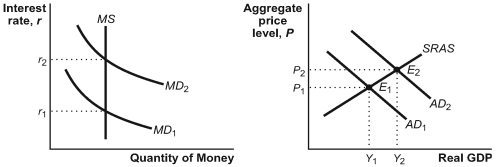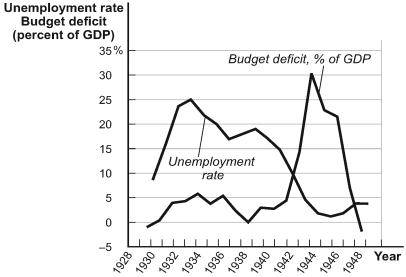Exam 17: Macroeconomics: Events and Ideas
Exam 1: First Principles198 Questions
Exam 2: Economic Models: Trade-Offs and Trade296 Questions
Exam 3: Supply and Demand264 Questions
Exam 4: Price Controls and Quotas: Meddling With Markets200 Questions
Exam 5: International Trade258 Questions
Exam 6: Macroeconomics: the Big Picture153 Questions
Exam 7: Gdp and the Cpi: Tracking the Macroeconomy321 Questions
Exam 8: Unemployment and Inflation332 Questions
Exam 9: Long-Run Economic Growth298 Questions
Exam 10: Savings, Investment Spending, and the Financial System385 Questions
Exam 11: Income and Expenditure130 Questions
Exam 12: Aggregate Demand and Aggregate Supply345 Questions
Exam 13: Fiscal Policy346 Questions
Exam 14: Money, Banking, and the Federal Reserve System428 Questions
Exam 15: Monetary Policy340 Questions
Exam 16: Inflation, Disinflation, and Deflation221 Questions
Exam 17: Macroeconomics: Events and Ideas309 Questions
Exam 18: International Macroeconomics441 Questions
Exam 19: Graphs in Economics60 Questions
Select questions type
To close an inflationary gap,the Great Moderation consensus on macroeconomics suggests that:
(Multiple Choice)
4.8/5  (46)
(46)
Classical macroeconomists believed that monetary policy should be used to fight recessions.
(True/False)
4.9/5  (40)
(40)
The theory of rational expectations is consistent with which statement?
(Multiple Choice)
4.9/5  (35)
(35)
The belief that fluctuations in the rate of growth of factor productivity cause the business cycle is:
(Multiple Choice)
4.7/5  (42)
(42)
According to the Great Moderation consensus,expansionary fiscal policy will shift the aggregate demand curve to the _____ and lead to a _____ level of output and a _____ level of employment in the short run.
(Multiple Choice)
4.9/5  (41)
(41)
During the 1960s and 1970s,most monetarists believed that the velocity of money:
(Multiple Choice)
4.8/5  (33)
(33)
Which statement is FALSE? At the time of the Great Depression:
(Multiple Choice)
4.7/5  (34)
(34)
The idea of sticky wages and prices is most closely associated with:
(Multiple Choice)
4.9/5  (35)
(35)
Use the following to answer questions:  -Friedman favoured:
-Friedman favoured:
(Multiple Choice)
4.8/5  (27)
(27)
Which statement is a point of the Great Moderation consensus?
I.Monetary policy should be the main stabilization policy.
II.The central bank should be independent of political influence.
III.Discretionary fiscal policy should be used sparingly.
(Multiple Choice)
4.8/5  (37)
(37)
The experience of the Great Depression led to the widespread acceptance of classical economics.
(True/False)
4.8/5  (44)
(44)
Which statement BEST explains why the central bank flirted with monetarism but then gave up?
(Multiple Choice)
4.8/5  (32)
(32)
Use the following to answer questions:  -Which statement is FALSE? Keynesian economics:
-Which statement is FALSE? Keynesian economics:
(Multiple Choice)
4.8/5  (40)
(40)
Showing 201 - 220 of 309
Filters
- Essay(0)
- Multiple Choice(0)
- Short Answer(0)
- True False(0)
- Matching(0)